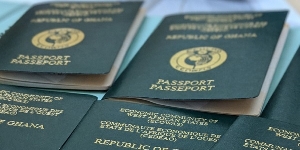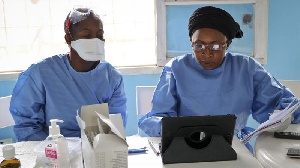Mr Justice K.C. Amua-Sakyi, Chairman of the National Reconciliation Commission (NRC), says the Commission is not an appendage of any political party nor would it allow itself to be used to promote the agenda of any.
He said although the NPP government established the Commission it was an autonomous body tasked to reconcile the nation and urged the public to take advantage of it to come and tell the human rights abuses they suffered especially during military regimes in the country.
Mr Justice Amua-Sakyi was reacting to a complaint made by a petitioner, Madam Talhatu Mohammed, at the sitting of the Commission in Tamale on Thursday that some people in the Municipality were asking those of them, who had petitioned the Commission not to show up because they would be shown on television and their names would be written down for a possible retaliation in the event of a change of government.
He said "it would be too late for anybody to seek redress when the Commission sitting is over", adding " if you do not come forward there is no way we can make appropriate recommendation to the government for reparation to you."
The Most Reverend Charles G. Palmer-Buckle, a member of the Commission, appealed to the public to bear with the Commission when they asked certain sensitive questions that bordered on their cultural, religious and social lives which they might be ignorant about.
He said certain questions asked by members were not deliberate but to help them establish the truth and to also enable them to empathize with them during the periods they suffered the atrocities.
Bishop Palmer-Buckle was explaining a statement he made that did not go down well with the people.
He had said he was surprised that only women were appearing before the commission and wondered whether it was not the culture of Dagomba men to standby their wives in such situations.
Lt General Emmanuel Erskine, a member of the Commission, urged Madam Mohammed to encourage other people, who had been victimized, to appear before the Commission to tell their stories and advised them to report to the Commission all those who had threatened them. Madam Talhatu Mohammed, a trader at the Tamale Central Market, told the Commission that on February 8, 1982, she heard an announcement through the Information Services Department Van that nobody should go to the market for the next two days because some exercises would be carried out at the market.
She said she obeyed the directive and stayed away from the market for the two days. On February 11 her daughter informed her that the market was on fire.
Madam Mohammed said she rushed to the market, intending to retrieve some of her goods but armed soldiers had surrounded it.
She said some onlookers warned her not to enter the market because the soldiers were shooting indiscriminately and that her life would be at stake if she ventured entering the market.
Madam Mohammed said she went back to the market the next morning only to find that all the goods in her shop valued at about 100,000 cedis at that time were completely burnt.
She said after sometime she and other traders, who lost their items in the blaze appeared before two separate committees and met some officials from Accra.
''They took down our particulars and the lists of items destroyed in the fire but no compensation has been given us.''
She said as a result of the incident she has become bankrupt and had not been able to educate her five children. She was compelled to give out her three girls for marriage. She appealed to the Commission to help her to get compensation.
Madam Lamnatu Abdulai, also a trader at the market, said she returned from Accra the previous day with 235 bags of wheat flour, 135 bags of sugar, 125 cartons of soap and discharged them into her shop.
She said she lost all the items when the market got burnt and has since then been financially weak, making it difficult for her to educate for her children.
Madam Barichisu Yakubu, another trader at the market, said she used to trade in aluminium wares and got her supplies from the then Ghana National Trading Corporation.
She said she was at home when her husband rushed in and told her that the market was burning and warned her not to go to the market because soldiers were killing people around the market.
Madam Yakubu said she had 20 boxes of guardian soap, 20 pieces of wax prints and 30 pieces of toilet roll among other goods in her shop at that time.
Hajia Saratu Yakubu, now an iced water and kenkey seller, said in 1979 she used to sell provisions and textiles at her shop in the market but one-day soldiers came and sold the goods at "control price" and realized 17,000 cedis but gave her 5,000 cedis out of the amount.
She said she heard the soldiers were looking for her so she fled from Tamale. She was later informed that some soldiers came looking for her in her absence
Hajia Yakubu, a trader, said soldiers went and searched her room and found nothing but on suspicion that she might have hoarded some goods in the ceiling brought an empty drum and ordered her sister to hold it firmly for one of them to mount and search the ceiling.
She said when they found nothing in the ceiling one of the soldiers asked her sister why she was so fair in complexion and wanted to know whether it was as a result of her dealing in ''Kalabule" and smuggling.
She said her sister was then ordered to strip her dress to her waist level for the soldier to inspect and after he had looked at her he concluded that it was her natural complexion. The soldiers then took a piece of cloth and left the room.
She said during the December 31, 1981 Revolution she again lost her goods including cartons of soap, sugar, wheat flour, wax prints and a cash of 13,000 cedis when the Tamale Central Market was burnt.
Madam Muniratu Sulemana, now unemployed, said she had in stock 25 full pieces of GTP, 25 pieces of ATL wax prints and eight sacks of shea butter, two sewing machines in her store at the Tamale Market and were destroyed when the market was burnt.
Madam Sulemana said because of her indebtedness she had to sell items given her during her wedding to defray some of her debts.
Mr Abdulai Imoro said he used to sell carbide, fishing nets and sugar at the market but lost everything to the fire.
Mr Imoro, Chairman of the Tamale Market Traders Association, said he sold his vehicle for 35,000 cedis and invested all that money into the business.
General News of Saturday, 21 June 2003
Source: gna












